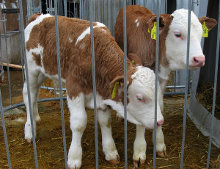Eccentric farmers can kiss privacy goodbye
 In a fascinating article by anthropologist Lizzy van Leeuwen in De Groene Amsterdammer last month, she describes how farmers’ association LTO, together with the Dutch government, has set up a system for detecting and dealing with early warning signs of the mistreatment of farm animals.
In a fascinating article by anthropologist Lizzy van Leeuwen in De Groene Amsterdammer last month, she describes how farmers’ association LTO, together with the Dutch government, has set up a system for detecting and dealing with early warning signs of the mistreatment of farm animals.
A database kept by Vetrouwensloket Welzijn Landbouwhuisdieren (the confidential office for the well-being of farm animals) tracks symptoms such as excess deaths and diseases, hurt and crippled animals, parasites, poor development of young animals, and so on.
Nobody could object to such a system, but the database also registers information about the farmers themselves based on the idea that unhappy farmers make unhappy farm animals. This information includes attendance at meetings and the number of friendships a farmer maintains. Do farmers stop answering their phones and do their relationships fail? It is all registered.
If the signals reach a certain danger level, a team is sent to the farmers in question to try and help them get back on track. Magazine Veeteelt ran a headline in 2010 that aptly describes the duality of this approach: “Animal neglect can happen to anyone. [This system] prevents a negative image of the industry.”
The result is that some farmers—the loners, the ‘known’ problem cases—are pushed into extreme transparency through a finely mazed network of ‘reporters’ or ‘snitches’, depending on who you talk to. These are often the ‘erfbetreders’, a Dutch word I did not know until yesterday meaning ‘those who walk onto the farmyard’—the people who have to be on the farm for business and who rat out the farmer on the side.
Van Leeuwen’s four page article goes into incredible detail on how farmers are viewed by the general public. She hypothesizes that the Dutch have lost contact with farming world. Between 1947 and 1990 the percentage of people working in agriculture dropped from 20% to 4%. The general public are now in the habit of seeing farmers through isolated incidents, such as the 2011 tragedy in which a farmer from Brummen, Gelderland killed about 100 cows with a tractor and then killed himself. Van Leeuwen speaks of “a trend of viewing farmers as professional animal abusers”.
The result is that farmers have not just become an out-group, but in order to close the ranks they have decided to nip rare and extreme cases of animal abuse in the bud by creating their own out-group of lonely and eccentric farmers. Ironically, this does not seem to apply to factory farming, a practice to which pretty much everybody turns a blind eye.
Van Leeuwen’s article, “De weg van alle vlees—dierverwaarlozing op de boerderij“, is available on the web (in Dutch), but unfortunately behind a pay wall.

[…] a better understanding between farmers and consumers. Felicia Alberding: “In most countries, farmers have become invisible over the past years. That anonymity is one of the reasons many people don’t value food and how it’s made any […]